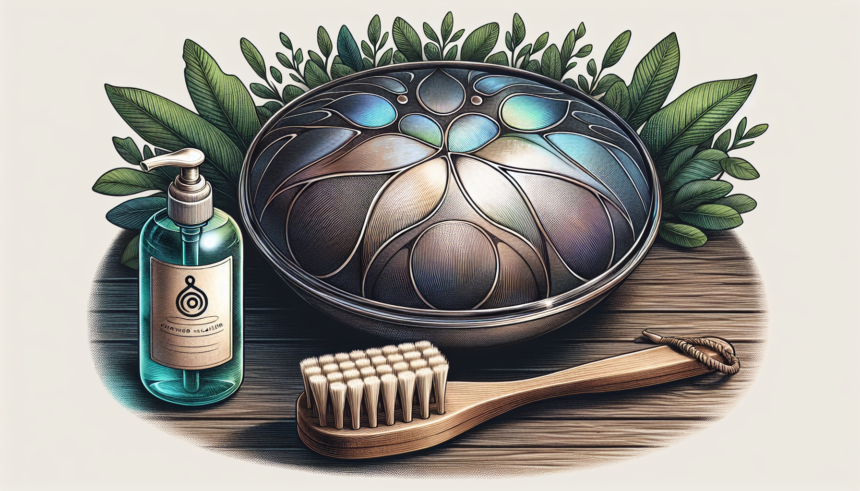<!DOCTYPE html>
<html lang="en">
<head>
<meta charset="UTF-8">
<meta name="viewport" content="width=device-width, initial-scale=1.0">
<title>Eco-Friendly Handpan Cleaning</title>
<style>
body {
font-family: Arial, sans-serif;
line-height: 1.6;
margin: 20px;
padding: 0;
}
header, section, footer {
margin-bottom: 20px;
}
h1, h2 {
color: #2c3e50;
}
h2 {
margin-top: 30px;
}
p, li {
color: #34495e;
}
ul {
padding-left: 20px;
}
</style>
</head>
<body>
<header>
<h1>Eco-Friendly Handpan Cleaning: Safe Solutions for Your Instrument</h1>
</header>
<section>
<h2>Introduction</h2>
<p>Handpans have become increasingly popular among musicians and Zen enthusiasts alike, celebrated for their unique sound and meditative qualities. To ensure the longevity and acoustic integrity of your handpan, regular maintenance and cleaning are essential. However, using harsh chemicals can damage the instrument and the environment. In this guide, we explore eco-friendly methods to clean your handpan safely and effectively.</p>
</section>
<section>
<h2>Understanding Handpan Materials</h2>
<p>Before diving into cleaning methods, it’s crucial to know the materials your handpan is made of. Most handpans are constructed from either nitrided steel or stainless steel, each requiring slightly different care techniques.</p>
<ul>
<li><strong>Nitrided Steel:</strong> This type of steel is treated to prevent rust and increase durability. However, exposure to moisture can still ruin its protective layer.</li>
<li><strong>Stainless Steel:</strong> Known for its rust-resistant properties, stainless steel requires minimal care, though it is still prone to fingerprints and smudges.</li>
</ul>
</section>
<section>
<h2>Why Choose Eco-Friendly Cleaning?</h2>
<p>Conventional cleaning products often contain chemicals that can harm both the environment and your handpan. Eco-friendly cleaning solutions are not only safer for the planet but also gentle on your instrument, preventing damage over time while maintaining its acoustic qualities. Here are some reasons to opt for green cleaning methods:</p>
<ul>
<li><strong>Non-Toxic:</strong> Eco-friendly cleaners are made from natural ingredients, avoiding harmful substances like phosphates or chlorine.</li>
<li><strong>Biodegradable:</strong> These solutions break down naturally, reducing environmental pollution.</li>
<li><strong>Pleasant Fragrance:</strong> Natural cleaners often have a subtle scent derived from essential oils, rather than overpowering chemical odors.</li>
</ul>
</section>
<section>
<h2>Eco-Friendly Cleaning Techniques</h2>
<p>To clean your handpan using environmentally safe methods, consider the following techniques:</p>
<ul>
<li><strong>Gentle Soap and Water:</strong> A mix of mild, biodegradable dish soap with warm water can effectively clean your handpan. Use a soft cloth or sponge, making sure to dry the instrument thoroughly afterward.</li>
<li><strong>White Vinegar Solution:</strong> A solution of equal parts white vinegar and water can help remove fingerprints and smudges. Dampen a soft cloth with the solution and gently wipe the handpan. Be sure to dry it completely to prevent any potential corrosion.</li>
<li><strong>Lemon Juice Mixture:</strong> Combine lemon juice with warm water for a refreshing, natural cleaning solution. This mixture’s acidity helps cut through grime while leaving a pleasant citrus scent. Wipe with a soft cloth and dry thoroughly.</li>
<li><strong>Baking Soda Paste:</strong> For stubborn stains, create a paste from baking soda and water. Apply the paste to affected areas, let sit briefly, then gently clean with a soft brush and rinse thoroughly.</li>
<li><strong>Essential Oils:</strong> Add a small amount of tea tree or lavender oil to your cleaning solution for added antibacterial properties and a soothing aroma.</li>
</ul>
</section>
<section>
<h2>Maintenance and Care Tips</h2>
<p>Regular maintenance is crucial to preserving the quality and lifespan of your handpan. Implement these care tips to prevent damage and keep your instrument in optimal condition:</p>
<ul>
<li><strong>Regular Dusting:</strong> Dust your handpan frequently with a dry, soft microfiber cloth to prevent build-up.</li>
<li><strong>Proper Storage:</strong> Keep your handpan in a padded bag or case when not in use, and store it in a cool, dry place away from direct sunlight and humidity.</li>
<li><strong>Protective Oils:</strong> Apply a thin layer of natural oil, such as coconut or jojoba oil, to the surface of your handpan periodically to provide a protective barrier against moisture and dirt.</li>
<li><strong>Avoid Excessive Moisture:</strong> Prevent water exposure by keeping your handpan out of rain and away from places with high humidity.</li>
</ul>
</section>
<section>
<h2>Conclusion</h2>
<p>Maintaining your handpan with eco-friendly cleaning solutions not only preserves its unique sound and aesthetic appeal but also contributes to a healthier planet. By choosing natural, safe cleaning methods and following regular maintenance routines, you ensure the longevity and performance of your cherished instrument. Embrace these green cleaning practices to protect your handpan and the environment simultaneously.</p>
</section>
<section>
<h2>FAQs</h2>
<h3>1. Can I use regular household cleaners on my handpan?</h3>
<p>No, it is not recommended to use regular household cleaners on your handpan as they can contain harsh chemicals that may damage the instrument's surface and affect its sound quality.</p>
<h3>2. How frequently should I clean my handpan?</h3>
<p>The frequency of cleaning your handpan depends on the usage and environment. Generally, a gentle cleaning and dusting once a month, along with periodic maintenance, will keep it in good condition.</p>
<h3>3. Is it necessary to use protective oils on my handpan regularly?</h3>
<p>Yes, applying a thin layer of natural oil occasionally helps protect the handpan’s surface from moisture and corrosion, especially for nitrided steel models. Ensure you use oils that do not leave a sticky residue.</p>
<h3>4. What should I avoid when cleaning my handpan?</h3>
<p>Avoid using abrasive materials or harsh chemicals. Don’t expose your handpan to water for extended periods, and always ensure it is thoroughly dried after cleaning.</p>
<h3>5. Are there eco-friendly commercial cleaners available for handpans?</h3>
<p>Yes, there are eco-friendly commercial cleaners specifically designed for handpans. These products prioritize natural ingredients and are formulated to safely care for musical instruments without harmful effects.</p>
</section>
<footer>
<p>By adopting these eco-friendly cleaning practices, handpan enthusiasts can contribute positively to environmental conservation while ensuring that their beloved instruments are well-cared for.</p>
</footer>
</body>
</html>Eco-Friendly Handpan Cleaning: Safe Solutions for Your Instrument

Leave a comment




